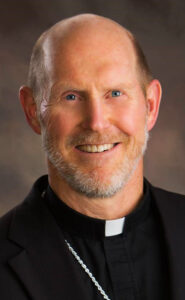By Bishop Thomas Zinkula
For The Catholic Messenger
It is important to search for what is at the root of the current tragic state of affairs in the Church. Some people want to scapegoat obligatory celibacy, a male-only priesthood or homosexuality. However, U.S. demographic statistics demonstrate that married, non-celibate men are a significant source of child abuse, so we need to look more deeply.

With regard to homosexuality, which is perhaps the most commonly suggested reason, about 80 percent of the survivors of clergy sexual abuse are male, but research has found that most of the perpetrators didn’t consider themselves to be homosexual. They instead were “situational generalists” (i.e., they abused whomever they had access to and control over, boys or girls).
I agree with Pope Francis that the root cause of the problem is clericalism. In his letter to the people of God (8/20/18), the Holy Father wrote, “To say ‘no’ to abuse is to say an emphatic ‘no’ to all forms of clericalism.”
So, what is clericalism? Clericalism is an exaggeration of the role of the clergy to the detriment of the laity. In a culture of clericalism, clerics are put on a pedestal and the laity are overly deferential and submissive to them. Pope Francis notes that clericalism is not only fostered by priests, but also reinforced by lay people.
Please allow me to define who I am talking about. Technically, a “cleric” is someone who is ordained: a bishop, priest or deacon. But, sad to say, “clericalism” may also affect those preparing for ordained ministry as well as those serving as lay ministers.
Perhaps a few examples of clericalism would be of assistance: 1) Coddling seminarians and telling them how special they are. 2) Insisting that priests or deacons go to the front of the line at meals and wakes because they are more important and busier than everyone else. 3) People telling me, when I am pondering an issue, “Whatever you want, Bishop.”
The issue here is privilege. Which can lead to a sense of entitlement, superiority and exclusion. Which can lead to a mindset that the rules don’t apply to me. This, in turn, can lead to an abuse of privilege and power, which tragically includes the sexual abuse of minors.
Yes, we need to continue to punish sexual offenders and establish rigorous prevention programs. Yes, we need to develop clear policies and procedures that hold bishops accountable for abuse and the cover up of abuse. Yes, the laity needs to be more involved in the inner-workings and leadership of the Church.
But that isn’t enough. The clerics who did the abusing and covering up obviously are directly responsible for their actions and need to be brought to justice. However, I would like to suggest that a culture of clericalism laid the foundation for their offenses; it made it easier for them to offend.
I realize that I am treading on delicate ground in mentioning these things, but some of us did not believe the allegations of victims of abuse; some survivors who went public were ostracized by fellow parishioners; some law enforcement officers let offending priests off the hook. And clericalism, which involves all of us, played a significant role in this.
Taking the cue from Pope Francis, I asked the members of our local church to pray and do penance during the Fridays of September. Now I ask you to help break down the culture of clericalism. It is so engrained in our Catholic culture that we have difficulty seeing and naming it, but if we look closely and honestly, it will manifest itself.
In order to overcome clericalism, we need to reclaim the common priesthood of the faithful. As St. Paul tells us (1 Cor 12:12-31), together we make up the body of Christ — each with our particular vocation, each necessary for the healthy working of the body. We should not equate distinct roles with differences in worth, dignity or holiness.
As Pope Francis advocates, let’s work together to create a new culture and renew the Church. Vision 20/20 is one avenue for this. Together, as clergy and laity, we are preparing to exercise our common baptismal mission to share the joy of the Gospel with others as disciples of Christ.












Very well written. A personal caveat, however; the examples the Bishop described are a thing of the past in many places. Currently, I am observing a trend of “anti-clericalism” in many mainstream Christian and Jewish Religions, especially in less populated communities. What I am witnessing as a clergyperson with emeritus status is a blatant disregard and/or valuing of ordained clergy, who are being replaced by volunteer lay leaders, politically active in their congregation/parish, who position themselves in a way so as to add pulpit and life cycle ceremony officiation to their personal “bucket list.” When this occurs those in ministry are merely tolerated, rather than bestowing on them an overabundance of respect.